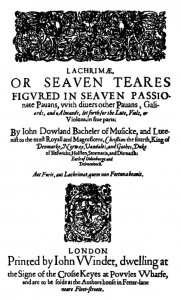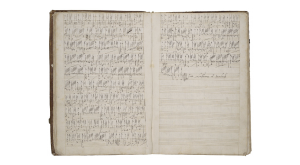Resilience Reimagined: 3: Time Stands Still (John Dowland)

In the past few months music has been spoking to me in a decidedly different voice. The more I listened to pieces I thought I knew, the more I realised that what I was hearing was the emerging voice of resilience, strengths we draw on when confronted by forces that can affect us or harm us. What we used to call coping skills.
We live in the wake of a pandemic flood, tossing and turning on this little ark that contains us. All aspects of daily life, our hopes, and our precious dreams continue to be disrupted. During this extended period of uncertainty, one of the composers who has jumped to the top of my “resilience playlist” is John Dowland (1562/3-1626), a contemporary of William Shakespeare. As the bard constantly shifted focus from comedies to histories, then tragedies, and then back again, Dowland was a musician resolutely focused on melancholy. A much-used title in his works: Lachrimae.
Born in London, educated at Oxford University, Dowland converted to Catholicism which, he claimed made him un-hirable as a court musician in Elizabethan England. He crossed the channel and to perform and write lute music and songs in Germany, Italy, and Denmark. He was kicked out of Denmark on allegations of being a spy. He returned to an England experiencing a major disruption as it made the shift (or using the Covid-19 lexicon: pivot) from Elizabeth I’s House of Tudor to James I’s House of Stuart.
In addition to evoking broken-hearted sadness and grief in his music, he continued to write songs about passionate love. But on closer scrutiny, many can seem like hymns in disguise. Time Stands Still is one of them. On the surface, this is familiar romantic “lover-to-his-lass” material: “Time stands still with gazing on her face…Cupid doth hover up and down blinded with her faire eyes.” But then, when you get to the final lines, the identity of the person being gazed upon suddenly blurs:
My settled vows and spotless faith no fortune can remove
Courage shall shew my inward faith, and faith shall try my love.
The courage to hold on to faith in trying times. But whose “image” is he looking at? Is this a hymn to the Virgin? This is where times stands still when we address a very human challenge: sorting out “internal” and “external” expressions of what we believe.
Dowland is difficult to pin down. He’s artfully ambiguous, even though when it came to the business of music, he couldn’t be clearer. He wanted control, especially at time when the word copyright had not entered the vocabulary. Dowland paid to get his works printed, volume by volume, then licensed one bookseller to sell them, and hoped for the best.
I think of all those musicians today who have been forced to “go online” as their scheduled gigs and seasons were cancelled. Dowland probably would have done very well as a musician in a locked-down world, he would be sure to find a way to monetize his product, in addition to free some generous free offers!
But back to ambiguous intentions and time standing still. I am reminded of the canoes that were central to the previous article in this series. During the exact same decades that Dowland performed and published love songs with a parallel purpose, Jesuit missionaries on this side of the Atlantic were learning to handle canoes. After sailing from “old” France to New France, they sought to bring lost souls to God. Time stands still. Lives are changed forever.
Stopping time is impossible. We may struggle to hold on to the way things were, as we face this uncertain new “now”. The known and the unknown, the feared and the hoped for, vying for attention. For now, and for a better tomorrow, for every one of us. A little like faith. A little like resilience, something that demands courage, especially in moments of uncertainty and danger.
You can hear Anthony Rooley and the Consort of Musicke perform John Dowland’s Time Stands Still here:
https://www.youtube.com/watch?v=ihe14DWy3IA
+++++++++++++++++++
Next in the series, resilience and late-in-life “bloomers.”
+++++++++++++++++++++
The links in the series are to external sites and were accurate when posted, and igNation has no responsibility for their persistence or accuracy and does not guarantee that any content on them is, or will remain, accurate or appropriate.”




Peter Bisson
Posted at 11:18h, 02 SeptemberThank you Kevin!